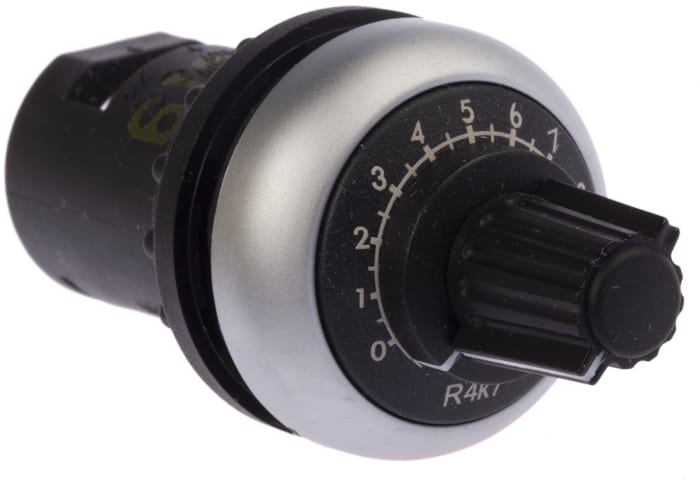Technical documents
Specifications
Brand
EatonMaximum Resistance
47kΩ
Number of Turns
1
Power Rating
0.5W
Mounting Type
Screw Terminal
Termination Style
Screw
Shaft Length
29.2mm
Shaft Type
Circular
Series
RMQ-Titan
Tolerance
±10%
Country of Origin
Morocco
Product details
Eaton Potentiometers - M22 Series
Eaton’s M22 range of rotary potentiometers enable a user to regulate and change the current that flows through a circuit, these rotary potentiometers can be easily controlled by turning the adjustable spindle or knob. These potentiometers are panel mount with screw terminals for easy mounting inside control panels and other electronics.
Features & Benefits
• Screw terminals meaning this device can be installed with just a screwdriver
• Panel mounting
• Precision twist action on the rotary knob to set the value
• Features an IP66 rating, this means that the potentiometer is protected against dust that may cause harm to it, this rating also means that the potentiometer is protected against low-pressure water jets (all directions)
• 1 - 470 kOhms maximum resistance
• ±10% tolerance (linear)
• Forms part of the M22 series
What is a Potentiometer?
A potentiometer is a variable resistor that increases or decreases the resistance in an application. Usually available as either digital or analogue, there are many different types of potentiometer but the two main types are rotary and linear.
• Linear - comes in a rectangle strip shape and can be pulled up or down for the required resistance, used a lot within sound systems for mic output or volume control.
• Rotary - the shaft is housed by a knob, you would find these on dimmer switches or speakers, and turning (usually to the right) will increase the resistance amplifying the output, whether that is light, sound or voltage.
How do Potentiometers work?
Potentiometers have two terminals that are fixed to a resistive element (the track). The resistive element is typically wire wound or made from carbon, cermet or conductive plastic. The third terminal is connected to the wiper, which is a sliding contact. As the wiper moves along the track, the resistance changes and the current flowing through the circuit changes.
Stock information temporarily unavailable.
Please check again later.
P.O.A.
1
P.O.A.
1
Technical documents
Specifications
Brand
EatonMaximum Resistance
47kΩ
Number of Turns
1
Power Rating
0.5W
Mounting Type
Screw Terminal
Termination Style
Screw
Shaft Length
29.2mm
Shaft Type
Circular
Series
RMQ-Titan
Tolerance
±10%
Country of Origin
Morocco
Product details
Eaton Potentiometers - M22 Series
Eaton’s M22 range of rotary potentiometers enable a user to regulate and change the current that flows through a circuit, these rotary potentiometers can be easily controlled by turning the adjustable spindle or knob. These potentiometers are panel mount with screw terminals for easy mounting inside control panels and other electronics.
Features & Benefits
• Screw terminals meaning this device can be installed with just a screwdriver
• Panel mounting
• Precision twist action on the rotary knob to set the value
• Features an IP66 rating, this means that the potentiometer is protected against dust that may cause harm to it, this rating also means that the potentiometer is protected against low-pressure water jets (all directions)
• 1 - 470 kOhms maximum resistance
• ±10% tolerance (linear)
• Forms part of the M22 series
What is a Potentiometer?
A potentiometer is a variable resistor that increases or decreases the resistance in an application. Usually available as either digital or analogue, there are many different types of potentiometer but the two main types are rotary and linear.
• Linear - comes in a rectangle strip shape and can be pulled up or down for the required resistance, used a lot within sound systems for mic output or volume control.
• Rotary - the shaft is housed by a knob, you would find these on dimmer switches or speakers, and turning (usually to the right) will increase the resistance amplifying the output, whether that is light, sound or voltage.
How do Potentiometers work?
Potentiometers have two terminals that are fixed to a resistive element (the track). The resistive element is typically wire wound or made from carbon, cermet or conductive plastic. The third terminal is connected to the wiper, which is a sliding contact. As the wiper moves along the track, the resistance changes and the current flowing through the circuit changes.


